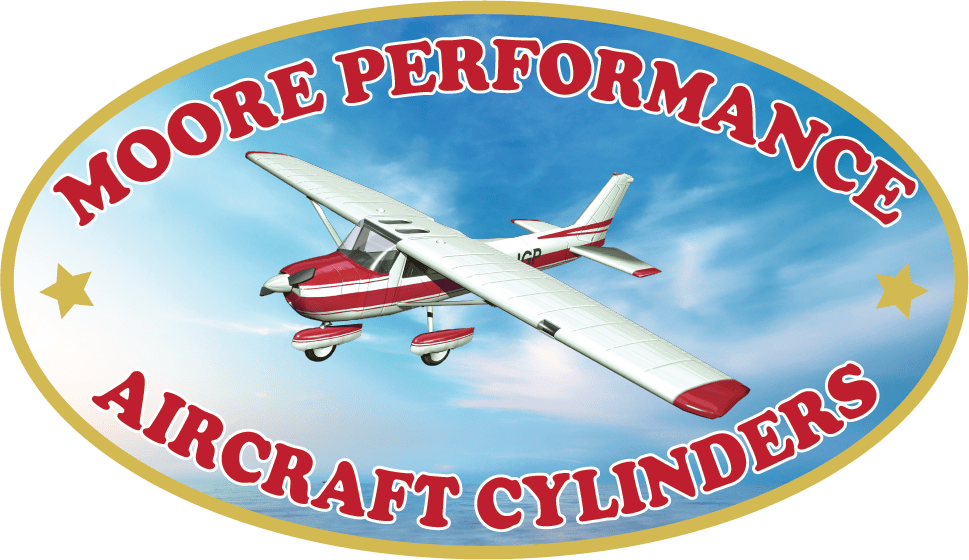Your best defense against aircraft engine failure is a good defense when it comes to maintenance; and a good aircraft maintenance program should include vigilant monitoring of your aircraft cylinders – one in which, among other things, you keep a watchful eye on compression trends, inspect your oil burn rate and remain observant of the appearance of your oil. All of this aircraft cylinder attentiveness will help enable you to take the best care and most economic course of action toward maintaining optimal aircraft engine health and safety.
So, let’s talk specifics. What are some signs that should alert you that something isn’t quite right and you may be in need of aircraft cylinder repair? First, you have your obvious indicators of aircraft cylinder trouble, such as a crack in a cylinder which may also result in oil seeping from the head-to-barrel joint. This type of signal that your aircraft cylinder needs repair requires immediate action.
More subtle signs that your aircraft cylinder is in need of an overhaul may be acquired through testing by an experienced aircraft overhaul mechanic. For instance, if your aircraft oil, which can be an exceptional indicator of engine issues, darkens soon after an oil change, this could indicate piston problems. More specifically, it could mean that you have worn or broken piston rings and blow-through which man result in fouled plugs and excessive crankcase pressure.
You can sometimes discover a blow-by problem by simply smelling the difference in your oil. A trained mechanic can determine the actual extent of your blow-by issue. Additionally, and more accurately, an oil analysis can help by providing a breakdown of the quantity of each material present within an oil sample and, subsequently, pinpointing any abnormalities and where they are occurring.
Poor seals are problematic as well. When the aircraft engine is not running, a poor seal between the rings and cylinder may allow oil to seep into the spark plugs, filling them with oil and leading – once again – to fouled plugs.
Your compression factor is another item you or a trusted mechanic should stay on top of. Much like relying on your sense of smell to uncover a blow-by issue, you can sometimes rely on your hearing or feeling to diagnose compression problems. If your aircraft cylinder is failing to maintain pressure, you may be able to determine where the air is escaping simply by listening or feeling for that unwelcome air flow.
In addition, the amount of compression your aircraft cylinder is able to maintain can wane over time. So, it’s a very good idea to keep tabs on your compression situation. You can even easily accomplish this the good, old fashioned yet extremely reliable old school way. For example, let’s say you use a two-part pressure gauge, you fill your cylinder with 80 psi (pounds per square inch) of air and the gauge reads 75 over 80 – meaning your cylinder is retaining 75 psi. Typically, a mechanic might record these numbers with a date on top of the rocker covers as a reference. So next time your compression is checked, everyone knows exactly how much and how fast your compression situation is deteriorating (or not).
Ok so, how bad can you let compression issues go before overhauling your aircraft cylinders? It all depends on the type of aircraft engine you have. For example, while 65 over 80 psi may be an acceptable compression limit on one engine, it may not be an acceptable compression limit for another aircraft engine. Consequently, adhering to manufacturer specifications, when it comes to compression, is imperative.
The longevity of an aircraft cylinder will depend upon the type of cylinder, its use and whether or not sufficient and proper attention and maintenance took place throughout the lifespan of that aircraft cylinder.
So, what is the best course of action to elongate the life expectancy of your aircraft cylinders? The typical time between aircraft cylinder overhaul periods recommended varied from manufacturer to manufacturer. That said, an aircraft owner/operator should refer to manufacturer specifications; and quite possibly, a top overhaul – where all of your aircraft cylinders need to be replaced at once – should take place when your aircraft cylinders no longer meet the manufacturer recommended criteria.
Conversely, since aircraft cylinders operate independently of one another and can experience different airflow, temperatures, cooling rates and more; you may also run into a situation in which you may want to address the repair of each aircraft cylinder separately. When a proper inspection and maintenance plan has been put into place, a decent mechanic will be able to advise you when a particular aircraft cylinder requires repair.
Cracks, broken valves and faulty seals can result in low compression and, much worse, complete engine failure. Optimally operational aircraft cylinders can help prevent engine failure. Put yours in the capable hands of an aircraft cylinder overhaul and repair service center you can trust – Moore Performance Products. Family-owned and operated since 1995, Moore Performance Products has specialized in aircraft cylinder overhauls and repairs for well over 25 years – providing them with the experience, knowledge and skill to keep your aircraft cylinders running at peak performance.
Providing a variety of overhaul services nationwide and overseas for both the aircraft and aerospace industries, Moore Performance Products has been endorsed by the Federal Aviation Administration (FAA) as a certified repair and welding station. Moore Performance Products is located at 123 W. Park Avenue, Building 1 in Edgewater Florida. Please feel free to call our knowledgeable customer service team at 386-409-7501 or 888-409-7555 any time between 9 a.m. and 5 p.m., Monday through Friday.


